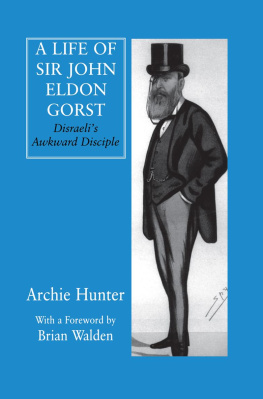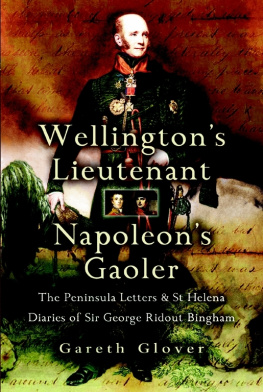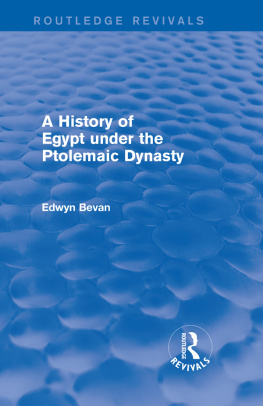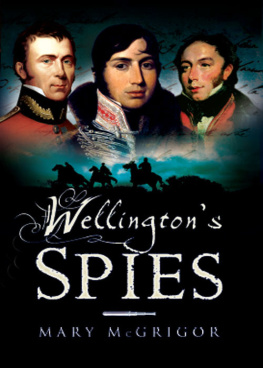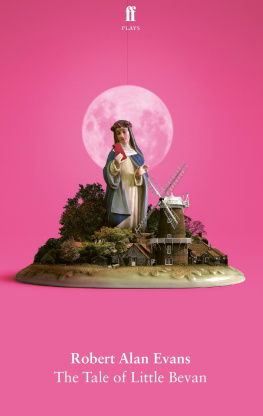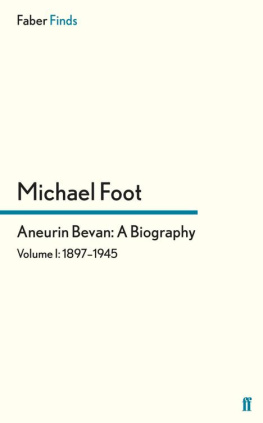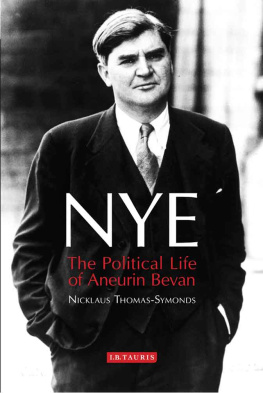Dedicated to the descendants of Charles and Mary
Bevan and especially to the memory of Major James
Bevan and Anne Colfer
First published in Great Britain in 2003 by
LEO COOPER
an imprint of Pen & Sword Books
47 Church Street, Barnsley, South Yorkshire, S70 2AS
Copyright 2003 by Archie Hunter
ISBN 1 84415 029 1
Typeset in 13/14.75pt Garamond by
Phoenix Typesetting, Auldgirth, Dumfriesshire
Printed in England by
CPI UK
Introduction and
Acknowledgements
The dramatic escape in May 1811 during the Peninsular War of 1,000 Frenchmen from the encircled garrison of Almeida in Portugal is well known to historians and to students of the war. It is also known that Wellington blamed, for what he perceived to be a major disaster, the young commanding officer of the 4th Foot (The Kings Own Royal Regiment), Lieutenant-Colonel Charles Bevan. To Wellingtons fury Bevan and his men were not present, as ordered, to defend the important bridge at Barba del Puerco over which the garrison made its escape. Bevan, believing himself and his regiment to have been unjustly blamed by Wellington for the escape, requested an inquiry, a request which Wellington refused.
The untimely death of Bevan in the Portuguese town of Portalegre two months after the episode described has also been alluded to by historians but until recently virtually nothing has been known about Bevan and his life. This has changed with the discovery among the Bevan family papers of some eighty letters which Bevan wrote to his wife in 1804/1811 while abroad or on campaign in the French revolutionary wars.
This book aims to break new ground by
telling the story of Bevans life and examining his character and military capabilities;
analysing the circumstances of the escape of the French garrison and of the part played by the 4th Foot, in the light of the orders issued by Wellington, in trying to prevent it.
I am grateful for the permission I have received to use and quote from unpublished copyright and other material in the care of the Museum of the Kings Own Royal Regiment at Lancaster; the Museum of the 15th/19th The Kings Royal Hussars at Newcastle-upon-Tyne; the National Library of Scotland; the Public Record Office at Kew; Soldiers of Gloucestershire Museum at Gloucester, and the owners of both the Bevan papers and the manuscript of Georgina Bevans unpublished novel about the life of Charles Bevan.
This book would not have been written but for the inspiration of William Colfer whose late wife Anne was a direct descendant of Charles Bevan. It was he who collected together and then transcribed the Bevan letters. For the enthusiastic help he has given me in many different ways, including research, I am most grateful. He also read and commented on my manuscript as have both my brother David Hunter and Colonel Gerald Napier. Their trouble and valuable advice has been greatly appreciated. I am also indebted to Rear-Admiral Tom Bradley and Captain Guy Crowden for their guidance on certain naval matters, to Iain Fletcher for alerting me to the article written many years ago by the historian S.G.P. Ward on the escape of the garrison from Almeida, to Michael Ponting for his expert contribution with regard to the production of some of the illustrations and to both Wendela Schurmann and Paddy McCrimmon for the work they did on some of the French aspects of my book.
Other very useful help and advice was kindly given by Sigrun Appleby, Dr Iain Brown, Principal Curator, Department of Manuscripts, National Library of Scotland; the staff of Crewkerne Library; Emily Davis of the National Army Museum; Peter Donnelly, Curator, Kings Own Royal Regiment Museum; Sir John Gorst; Elyn W. Hughes; my son Archie Hunter and his son Archie; Henry Keown-Boyd; my granddaughter Georgia Mann; Gwen McClay; Oriel Art; Dr Paulo Lowndes Marques; Claud Rebbeck; George Streatfeild; Ralph Thompson; Allison Wareham and Dr C.M. Woolgar, Head of Special Collections at the HartleyLibrary, University of Southampton. I am also grateful to Tom Hartman for his invaluable guidance as editor.
There cannot be too many authors these days who laboriously write out their texts in longhand, but I am one of them. This strange habit did not deter our old friend Lorna Kingdon from producing a beautiful typescript of my work. My profound thanks go to her. As always my final word is for my wife Mirabel. She has once again valiantly accepted the role of authors factotum. I cannot thank her enough for her enduring patience and sound advice.
Archie Hunter
Church House, Winsham
February, 2003
by
General Sir Michael Rose
The tragic story of Charles Bevan is not well known and its telling reminds us that, in the confused circumstances of war, it is indeed a thin line that separates a hero from someone who will forever be condemned by history as a failure. Following the bloody defeat of the French under Marshal Massna at Fuentes de Ooro, a battle that took place on 35 May 1811 and one that was deemed by the Iron Duke to be one of the most difficult battles of the entire Peninsula Campaign, Wellington attempted to prevent the subsequent evacuation of the nearby town of Almeida by the French. His specific orders were that the bridge over the River Agueda at Barba del Puerco should be seized in order to block the escape route of the French. These orders were despatched to Major-General Sir William Erskine who was dining at the time he received them but who failed to pass them on immediately. Much later that night General Erskine finally did give the necessary orders to Lt Col Charles Bevan commanding the 4th Regiment to march on the bridge. However, Charles Bevan and his Regiment arrived in situ too late and, as a result of this unfortunate and entirely unneccessary delay, most of the French garrison of Almeida were able to cross the undefended bridge at Barba del Puerco and so rejoin the main French army.
The Duke of Wellington was of course exceedingly irritated by this gross disregard of his orders and the subsequent escape of the French, and wrote: The business would have been different if wehad caught the garrison of Almeida. He was also deeply frustrated by the overall quality of his British generals in relation to those of the French and a scapegoat was needed. However, Sir William Erskine made quite sure that the blame did not fall on himself, but on the unfortunate Charles Bevan. This notwithstanding the fact that Wellington had no time for Erskine who had already been sacked once and who many of his contemporaries considered to be not only mad but also blind as a beetle.
Much of the evidence that has been gathered for this book is from contemporary eyewitness accounts written during the Peninsular War. They give a fresh insight into the hardships and difficulties endured by all those serving in Wellingtons Army at that time. Nevertheless his soldiers, including Charles Bevan, greatly admired Wellington and forgave him his mistakes, even though they often cost lives.
The demands of war and the qualities required by commanders and soldiers on the 21st century battlefield remain much the same as they were two hundred years ago. Sadly, today there is more of a blame culture in our nation. This tends to undermine the essential qualities of mental toughness and sense of service and duty among our citizens, qualities that will surely be needed if in the future we are to win wars as Wellington was able to do. This book offers us a useful and timely glimpse of another, more honourable, era that modern soldiers might do well to imitate.
Michael Rose
A temporary halt in a miserable village called Nave de Aver gives me time to inform my dearest Mary that Ld Wellingtons Army continues still in close pursuit of the French who are now almost out of Portugal. Two hours march carried us into Spain; we are but 4 Leagues from Ciudad Rodrigo (about 12 English miles). It is reported that they have thirty thousand men on the banks of the Agueda a river that divides these two countries. Or nearly so just to the north. They disputed the passage of the [River] Coa and we had some loss. Theirs, however, was much more severe. The 5th Division were ordered to drive a [French] Corps from their position. But that Corps moved off as we advanced upon them. The 4th Regt. have not yet fired a shot! I indeed thought that on that day we should have come in for our share of laurel; but the enemy would not give us the opportunity although they waited till we were within a few hundred paces of them.


